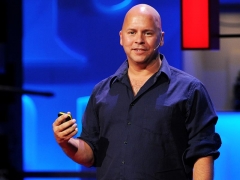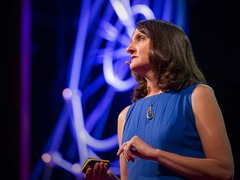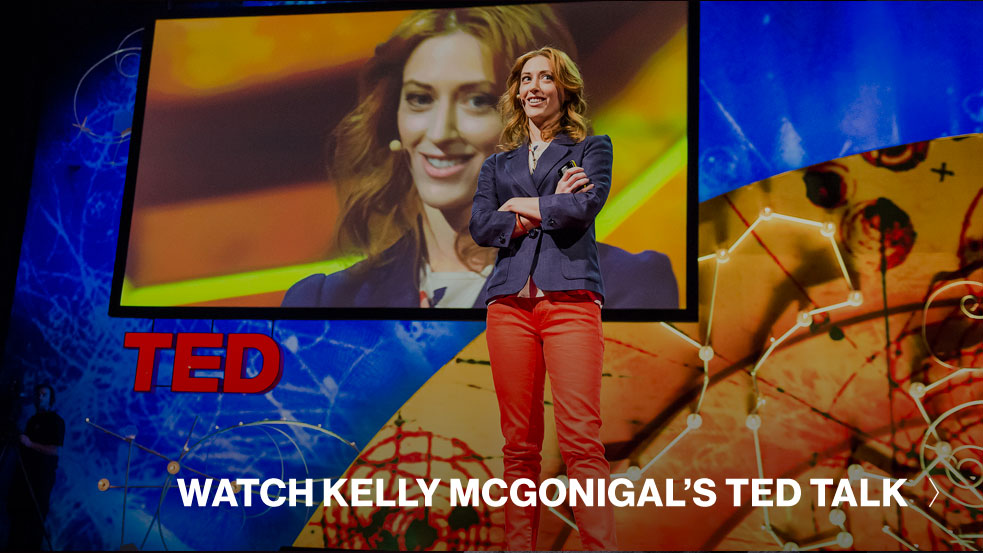
You’ve sworn off sweets in 2015. But, man, do these doughnuts look good. Kelly McGonigal shares how to formulate New Year’s Resolutions that help you think beyond immediate gratification. Photo: iStockphoto
By the second week of January, that resolution that once seemed so reasonable — go to the gym every other day, read a book a week, only drink alcohol on weekends — is starting to seem very … hard. As you are teetering on the edge of abandoning it all together, Kelly McGonigal is here to help. This Stanford University psychologist — who shared last year how you can make stress your friend — wants you to know that you’re not having a hard time sticking to a resolution because you are a terrible person. Perhaps you’ve just formulated the wrong resolution.
McGonigal has, for years, taught a course called “The Science of Willpower” through Stanford’s Continuing Studies program and, in 2011, she spun it into a book, The Willpower Instinct. The TED Blog spoke to McGonigal this week about how willpower is often misunderstood, and what we each can do to improve it. (We also asked her about the talk Why dieting doesn’t usually work.) Below, an edited transcript of the conversation.
So, why is willpower such a struggle?
It’s a great question. I define willpower as the ability to do what matters most, even when it’s difficult or when some part of you doesn’t want to. That begins to capture why it’s so difficult — because everything we think of as requiring willpower is usually a competition between two conflicting selves. There’s a part of you who is looking to the long-term and thinking about certain goals, and then another part of you that has a completely different agenda and wants to maximize current pleasure and minimize current stress, pain and discomfort. The things that require willpower pit those competing selves against each other. Willpower is the ability to align yourself with the brain system that is thinking about long-term goals — that is thinking about big values rather than short-term needs or desires.
The reason that so many things can trigger that kind of conflict is because that’s the essence of human nature. Modern cognitive neuroscientists see this as the fundamental structure of the human brain — that there are competing systems that think about the world differently and that respond to challenges differently. I think of it as: the immediate self versus the future self. We need both systems for survival. But a lot of our modern challenges really tempt us to be in the mind-state of immediate gratification, or escaping immediate discomfort. It can be quite a challenge to access the part of you who is willing to take that big picture and tolerate temporary discomfort.
So, given this idea of two competing selves who want different things, how effective are New Year’s resolutions for tapping into the ability to think long-term?
I think it depends on how you go about making your New Year’s resolution. Typically, when people are making a New Year’s resolution, they don’t start with the right questions, so they end up making a resolution that is ineffective. Most people start with the question: “What should I do?” It may not even be a conscious, implicit kind of thing, but they start from: “What do I criticize about myself that it’s time to change?” Or “what is it that I don’t really want to do that I know I should do?” It’s kind of a typical self-improvement perspective. “I don’t really like exercise, I guess I should do it.” Or “my closet is a mess, it’s time to get organized.” “I’ve never had a clean desk in my life, but I think that good people have clean desks, so this is the year I’m going to have one.”
People come up with resolutions that don’t reflect what matters most to them, and that makes them almost guaranteed to fail. Even if that behavior could be very valuable and helpful — like exercise — if you start from the point of view of thinking about what it is you don’t really want to do, it’s very hard to tap into willpower. If there’s no really important “want” driving it, the brain system of self-control has nothing to hold on to.
The kind of New Year’s resolution that works is when you start really slowing down and asking yourself what you want for yourself and your life in the next year. What is it that you want to offer the world? Who do you want to be, what do you want more of in your life? And then asking: “How might I get there? What would create that as a consequence?” When you start from that point of view, then New Year’s resolutions can be incredibly effective. They begin to turn your attention to choice points in your everyday life where there really are opportunities to align your energy and attention in the direction that matters to you. I think most people start from the choice points, without wondering whether this is even the right thing to be choosing. People get to the behaviors too soon, in my opinion.
Any tips for how to find those big things and then narrow them down to specific resolutions?
A very practical way is to ask: At the end of 2014 — on January 1st, 2015, looking backwards — what are you seriously going to be grateful that you did? Is there a change you know that you’re going to be glad you made? What would that feel like? That can tap into something that feels really authentic.
I was just doing a radio interview at one of the NPR stations in New York, and I was chatting with the studio producer. I asked her if she had any New Year’s resolutions, and she’s like, “Oh yeah — to stay fit.” She sounded so not enthusiastic. Then after a few seconds of silence, she said, “I’m kind of thinking about finding a way to play the piano again.” She was lighting up a little more. “It used to be so important to me, and I really miss it. It’s like my soul wants to play the piano again, and it would be giving it back to my soul.” And I’m like, “That’s your resolution! What is this getting fit stuff?”
By the way, you can spend the first week [of the year] looking around. One year my resolution was to focus on being a better mentor, and to look for ways in every professional relationship to do that. You start looking around, and you see every conversation as an opportunity to choose that value and move toward that goal. Just spend a week saying, “If what matters is improving my health, if what matters is spending more time with my family, if what matters is reconnecting to creativity, what choices do I make every day that either could get me closer to that?”
So on those things you feel like you should be doing — the going to the gym or the quitting smoking — is there a way to build your willpower towards those things?
One of the things I always encourage people to do is to not try to do things alone, and to start outsourcing their willpower a little bit. If it’s exercising, you should be doing it with a family member, a friend, a co-worker. Or sign up for a series of classes after work. Because then, it’s like a bigger pool of possible willpower. If you’re exhausted after work, and you normally would say, “Screw it, I’m going home,” if there’s somebody who is going to meet you in your office, and say, “Hey, aren’t we going for a walk now?,” it doesn’t matter if you feel like it in that moment. There’s going to be a bigger pool of motivation that will support you through when you’re feeling most exhausted or least motivated.
Another thing I encourage people to do is — if there’s a behavior that they put off or don’t do because of anxiety or self-doubt or because it’s boring or uncomfortable — bribe yourself. If you hate exercise but truly, truly want the consequences of exercising, you should give yourself permission to do whatever you don’t want to let yourself do — like read trashy gossip magazines, or download a whole series of a TV show that you can plop on in front of you on the treadmill. As long as it doesn’t conflict with your goal, then you should go ahead and pair the thing you don’t want to do with a reward that you might otherwise not give yourself permission for. That can be very effective for beginning to prioritize and make time for things.
Also, give yourself permission to do small steps rather than think that there’s an ideal you need to meet. I wrote a review paper about two years ago showing that you can get pretty much the same health benefits from doing 5 to 15 minutes of exercise a day as from an hour. There are a lot of things like that, where we think, “I won’t get my novel done unless I can put aside a whole weekend to write.” Well, you could create a novel in a paragraph a day. So I encourage people to think: what’s the smallest step that they could take that is consistent with their goal? And not necessarily worry about whether they believe it’s sufficient.
That is actually very freeing.
New Year’s resolutions can be fun! If you think of them like a science experiment, you can always learn something from a resolution. A lot of times, people aren’t willing to learn the lesson — and sometimes the lesson is that you think you want to change this, but you don’t really want to, and sometimes you don’t need to. That sometimes we look for the things we think we can control.
It’s funny how this happens sometimes even when we go after the things that really are core to our identity. I did this New Year’s resolution makeover once with this woman who had made the same resolution year after year to become a better cook, because she thought that’s what good moms and good wives did. She was a terrible cook, and she didn’t want to learn how to cook. That’s a mistake people make, is they think they’re just going to fundamentally change who they are with a resolution. “I’m going to become a morning person.” “I’m going to become a health nut.” “I’m going to become organized.” The best resolutions are ones that strengthen something you already are, but you may not have been fully investing in.
 Derek Sivers: Keep your goals to yourself
I wanted to ask about the idea of working with other people and outsourcing willpower. Have you ever seen Derek Sivers’ talk on TED.com? It’s called Keep your goals to yourself and it suggests that people are more likely to achieve goals if they keep them private.
Derek Sivers: Keep your goals to yourself
I wanted to ask about the idea of working with other people and outsourcing willpower. Have you ever seen Derek Sivers’ talk on TED.com? It’s called Keep your goals to yourself and it suggests that people are more likely to achieve goals if they keep them private.
There is some data that suggests you might feel like you have accomplished your goal if you can create a public identity as somebody who is pursuing that goal. And I have overwhelming feedback from my students in my Science of Willpower class that, if they actually can truly create the identity — that they really sense that “I am someone that trained for a marathon,” or “I am somebody who is committed to this” — that it actually makes it easier to make choices.
People are really interested in creating habits, and there’s so much excitement now about habit design. Habits are really, really hard to create because they require complete automaticity. You need to basically be making choices in the absence of any motivation and it takes a long time to get that in place. But when you have a value or commitment, that’s something different. It can be a conscious choice that when you’re in a restaurant — if your identity is as somebody who takes good care of your health — then that becomes a default way to make a good choice in that moment. Anything that you do to create that identity can actually make it easier to make choices that don’t feel like deprivation.
That’s one side of that research. Then there’s the whole other side of how social support and pride can support having more strength to move towards your goals. If you know that other people are paying attention to you, and you know that you’re going to be able to celebrate your success — you’re going to be able to post on Facebook that you actually did run that marathon, or even that you just made it to spin class, or whatever your version of that is — that anticipating that social sharing is very motivating for people. It’s more motivating than even success in itself. The self-savoring is not as motivating as knowing you’re going to be able to savor a success with somebody else. Then when you hit the wall — when you experience setbacks — social support encouragement is also so important for getting back on track.
I think that from top to bottom, making your resolution social allows you to access different supports, both internal and external. One more reason to go public — being a role model for someone. People will do things when they know that they’re inspiring change in others. It’s a natural progression that you see in many areas — whether it’s people who are recovering from addiction, or someone embarking on a physical challenge. This is what people naturally do.
 Sandra Aamodt: Why dieting doesn't usually work
And did you see Sandra Aamodt’s talk, Why dieting doesn’t usually work?
Sandra Aamodt: Why dieting doesn't usually work
And did you see Sandra Aamodt’s talk, Why dieting doesn’t usually work?
Yes! My talk was right after hers at TEDGlobal 2013. I remember basically agreeing with everything she said.
Her idea is that the brain seeks to keep weight stable over the long-run, so dieting can backfire because it makes a person so focused on food. Does that fit with your research?
There are two things she said that really stood out to me, and that I agree with very seriously. One was that she talked about the importance of being kind to yourself. She made the point that self-compassion is much more motivating than self-criticism. That’s very important. When I first started teaching the Science of Willpower, it was the thing nobody believed — researchers and psychologists and writers have done a great job of getting this message out, because I don’t get near the resistance I used to get to the idea. And still, it’s so amazing how many people believe that they are more motivated by self-criticism and shame than anything else. They aren’t really paying attention to the effect on their behavior and choices when they are that hard on themselves.
The other thing I remember Sandra saying was about the futility of trying to lose weight. And that’s absolutely right. Whenever I’m in any situation where people are asking me to talk about losing weight, I always try to change the language to creating health because you cannot control weight. It’s exactly what Sandra said — the brain and the body, they will fight you. Losing weight is almost always a consequence of making good choices — but it’s not always a consequence. You can make good choices and not lose the weight. The most important thing in Sandra’s talk was the idea that making the healthy choices is going to give you the consequence of health, even if you don’t lose the weight.
She showed a really interesting graph of four health factors — eating fruits and vegetables, exercise three times a week, not smoking, and drinking in moderation — and how, if people who are overweight do just one of those things, their risk of mortality lowers to the same level as a normal weight person.
I hope TED has more talks from obesity experts, because nobody knows this research about how weight doesn’t predict health. There’s so much important science out there that people are not paying attention to. That was my favorite part of her talk.
To bring it back to your TED Talk, How to make stress your friend, it sounds to me like what you’re saying about willpower is related — that it’s not so much whether you have willpower, but how you think about willpower.
I’ve been joking about that — that my work has always been to basically take an inner experience that people reject, force them to accept it and understand it, so that they can make peace with it. One of the reasons why I teach this Science of Willpower class and wrote the book is because I kept hearing from people that they felt like they had no willpower. They thought they were the only ones and that their willpower struggle was uniquely wrong with them — they were so lazy, they were so stupid, they were so hopeless. They didn’t understand the fact that we all experience willpower challenges. It’s part of what it means to be human.
It is similar to the way that I’m now trying to help people appreciate stress, and understand that this is human and that it can help us. It’s not always helpful, but there are aspects to it that, when we can make friends with it, we have a lot better chance of using it to good ends. I feel the same way about willpower. When you understand what a craving is and why it’s there, you can also appreciate the part of you who can make a different choice.
One of the big lessons from The Science of Willpower is if you really fight the inner experiences, it’s not going to end well. If you decide you’re going to fight cravings, fight thoughts, fight emotions, you put all your energy and attention into trying to change the inner experiences. People tend to get more stuck, and more overwhelmed. When you try to control the things that aren’t really under your control, you get to feeling more out of control. Whereas where you really have the freedom is in your choices.
That’s very similar to stress. If you think you can’t feel stress and that stress is always going to be toxic, you’re magnifying any of the toxic aspects of stress. By fighting stress, you’re making stress worse.
So, make friends with the fact that you can move towards goals that are really important to you?
Yes. Willpower is about being able to hold opposites. So I can feel the emotion, I can feel the craving, and at the very same time, I just make my awareness big enough to hold my commitment to make a different choice. Your ability to hold those opposites is what gives people willpower over time.

Comments (124)
Pingback: How to Tap Into Your Own Willpower | Recursos para Emprendedores
Pingback: How to Tap Into Your Own Willpower | Enjoying The Moment
Pingback: TEDtalk #5 – Kelly McGonigal: How to make stress your friend | Hazel Lee Vaughn
Pingback: The science of willpower: Kelly McGonigal | Zurich Malaysia
Pingback: The science of willpower: Kelly McGonigal on why it’s so dang hard to stick to a resolution
Pingback: How to Tap Into Your Own Willpower - Advanced Computer Learning Company
Pingback: New Years Thoughts | thekarmaconcept
Pingback: What to do after you fail at your New Year’s Resolutions | Scientific Goals